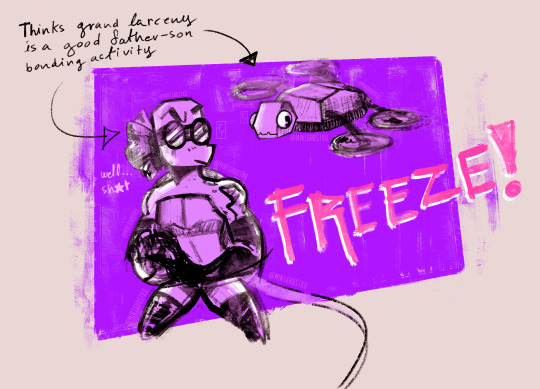#procurer
Explore tagged Tumblr posts
Text

Trump Weird News - Procurers' Agreement
#weird news#trump#donald trump#trump 2024#kamala harris#kamala#harris#harris 2024#harris walz 2024#weird#Zelensky#Ukraine#putin#procurer#handshake#shake#swiss alps#subvert freedom
22 notes
·
View notes
Text
Compenser
Nous tenons pour acquis que nous nous comprenons bien et que nous savons ce dont nous avons réellement besoin. C’est au nom de cette certitude d’ailleurs que nous revendiquons une autonomie et notre liberté. Alors, pourquoi nous procurer des biens afin de nous faire plaisir, et peu de temps après, nous en délaisser ? Se pourrait-il que l’achat de ces biens ne nous apporte pas le bonheur ? Et…

View On WordPress
0 notes
Text
probably will be FORCED by Pomp And Circumstance to go to the CLOWN HOSPITAL, for a CLOWN INJURY (may or may not be An ALLEGEDLY Fractured Foot...a MOURNFUL MALADY incurred in the most PATHETIC and LAPSIDAISICAL Fashion of TRAGICALLY UNFASHIONABLY Events......
Anyway. Forgot what I was saying. Buy me 1/25th of an x-ray or whatnot I guess
#ASK ME#ASK ME HOW I ALLEGEDLY BROKE MY FOOTSIE BONSIES!!!!#shall come up with a different answer EACH time and they shall ALL be curious concerning and browraising#no but really ASK ME i have SO. MANY. ANSWERS.#(the actual answer isn't even mundane if anything it is...Up There.)#(my personal curse is the inability to give a straight answer Even And Especially when the actual accurate answer is funnier!#sometimes the actual truth of the matter is funnier! life just works like that occasionally!!!#and still it is my duty--my god calling--to decieve#anyways an object fell on me or I fell on an object. that object maybe or may not be a planet. or may or may not be an undisclosed oblong.#or both. or neither. mind your business before i suck your tax evaded beeswax right under you#...i May be slightly loopy on the adrenaline aftermath of (ALLEGEDLY) breaking some damn bones#I'm cranky and i want to hobble to the kitchen to Procure some Frozen Breakfast Food#and yet i am bound to bed for the sake of Elevating The Limb#I Am Basically Tantalus Do You Comprehend I Am Tantalus I Am A Tortured Mythological Figure And You Are Standing By Like Impotent Cupbearer#s#YOU ARE AN IMPOTENT CUPBEARER AND I AM PROMETHEUS SCREECHING AS MY INNARDS ARE WOVEN INTO STATEMENT ART#......motherfricker my ice pack is leaking
838 notes
·
View notes
Text
I showed someone a photo of my room, and their response was “I thought this was a photo of a haunted house attraction at first”
I think. This is a success.

(This was the photo)
#context is we are making silly horror short films- and friend said we might need fake dead things for props#I said I have real dead things#I think they thought I was joking bc they went aaaah of course you just have a trove of dead things lying around???!?#and then I showed them the photo of my room#and explained… yes :3 I do ;3 and it’s all ethically procured by yours truly! straight from the forest floor!#vulture culture#bone collecting#bone collector#dead things
779 notes
·
View notes
Text

#ok sorry for mia i have been desperately trying to get all my ducks in a row re: new home#i have to do all my own landscaping and have vastly overestimated my ability to efficiently complete manual labor#but after a long day of installing chicken wire to keep the cats from escaping i am now stoned and filled with donuts 🥰#i still have to locate and procure a dining set but god i am so close to never having to exert energy ever again#me
3K notes
·
View notes
Text
















#the arcana#the arcana game#asra#asra alnazar#portia devorak#portia#lucio morgasson#count lucio#lucio#julian devorak#ilya devorak#nadia#nadia satrinava#muriel#muriel of the kokhuri#valdemar#quaestor valdemar#procurator volta#volta#natiqa#natiqa satrinava#morga#consul valerius#the arcana text post#incorrect arcana quotes
695 notes
·
View notes
Text
and she'll try to eat the gun

#my art#the arcana game#my artstyle#meme#the arcana courtiers#pontifex vulgora#procurator volta#the arcana vulgora#the arcana volta#couple goals..........? I don't ship them how would I know#the arcana#fanart#shitpost#shitposting#the arcana memes
767 notes
·
View notes
Text


courtiers <3
#THIS TOOK ALMOST 7 HOURS. BTW. I'M DYING /hyperbole#usually a piece will take like. an hour tops#the arcana#the arcana fanart#snoobgoobles#the courtiers#quaestor valdemar#pontifex vulgora#praetor vlastomil#procurator volta#consul valerius
933 notes
·
View notes
Text
How funny would it be if the system SY was assigned is a vehement SJ stan. It's known as the 'nr 1 SJ defender' among the other systems and will not let anyone talk shit about its blorbo.
System begs to get SY as its next assignment so it can pay him back for all the SQQ castration campaigns and slanderous rants. System is downright offended on its dear misunderstood meow meow's behalf and intend to make it SYs problem.
What better way for SY to atone than to force him to make SJs life better?
SY wants to insult SJ to his face? *Wrong buzzer noise* [user will be penalised -100 B-points if he continues :) ].
SY tries to participate in SJ gossip? [-30 B-points for OOC behavior] (SY: I don't even have an OOC lock?! >:o).
Someone else slanders SJ? [Mission defend SJs honor! accept/accept. Failure will lead to termination of account!].
And how infuriating would it be if, after SY is forced to spend time together with SJ, he realizes SJ isn't as bad as the book made him to be? If SY can appreciate his sharp tongue and clever mind. If he actually starts to enjoy spending time with SJ. (The system will never learn of this)
#svsss#SJ: why is this annoying gnat so obsessed with me? something is suspicious#system in background: my precious baby! I have procured a nice toy for you#SY:ffs just send me back to my body at this point#shen yuan#shen jiu#jiuyuan#scumcum#scum villain's self saving system
168 notes
·
View notes
Text

Don and Shelly scribble because I love them :)
chances are Dr. Feeling didn't mean for them to go on a robbery spree but they seem to be having fun so it's probably fine…probably (^^ゞ
#rottmnt#rise of the tmnt#rise of the teenage mutant ninja turtles#rottmnt donnie#rise donnie#rise donatello#rottmnt donatello#s.h.e.l.l.d.o.n#rise shelldon#rottmnt shelldon#donatello hamato#hamato donatello#rottmnt doodles#save rottmnt#unpause rottmnt#my art#artists on tumblr#doodles#art#mint draws#this is very scribbly but i think it's kinda cute so :p#they just need to procure some uranium... and some questionably safe mystic materials#so that they can continue their perfectly safe bonding time™ :)#all in the name of togetherness of course#and science >:D
270 notes
·
View notes
Text

a p l e
#the arcana#procurator volta#the arcana fanart#the arcana game#my art#artists on tumblr#the courtiers#digital art#fanart#illustration
201 notes
·
View notes
Text

Nancy Drew PC Games 3x3 Grids - Danger on Deception Island
~ Here's some Pacific North West magic for fall ~
#I'm starting to making a decent dent in these grids - will I finish them all? only time will tell#nd#nancy drew#nancy drew games#nancy drew fanart#nancy drew pc games#clue crew#her interactive#danger on deception island#digitial art#artists on tumblr#procure
160 notes
·
View notes
Text
Cleantech has an enshittification problem

On July 14, I'm giving the closing keynote for the fifteenth HACKERS ON PLANET EARTH, in QUEENS, NY. Happy Bastille Day! On July 20, I'm appearing in CHICAGO at Exile in Bookville.

EVs won't save the planet. Ultimately, the material bill for billions of individual vehicles and the unavoidable geometry of more cars-more traffic-more roads-greater distances-more cars dictate that the future of our cities and planet requires public transit – lots of it.
But no matter how much public transit we install, there's always going to be some personal vehicles on the road, and not just bikes, ebikes and scooters. Between deliveries, accessibility, and stubbornly low-density regions, there's going to be a lot of cars, vans and trucks on the road for the foreseeable future, and these should be electric.
Beyond that irreducible minimum of personal vehicles, there's the fact that individuals can't install their own public transit system; in places that lack the political will or means to create working transit, EVs are a way for people to significantly reduce their personal emissions.
In policy circles, EV adoption is treated as a logistical and financial issue, so governments have focused on making EVs affordable and increasing the density of charging stations. As an EV owner, I can affirm that affordability and logistics were important concerns when we were shopping for a car.
But there's a third EV problem that is almost entirely off policy radar: enshittification.
An EV is a rolling computer in a fancy case with a squishy person inside of it. While this can sound scary, there are lots of cool implications for this. For example, your EV could download your local power company's tariff schedule and preferentially charge itself when the rates are lowest; they could also coordinate with the utility to reduce charging when loads are peaking. You can start them with your phone. Your repair technician can run extensive remote diagnostics on them and help you solve many problems from the road. New features can be delivered over the air.
That's just for starters, but there's so much more in the future. After all, the signal virtue of a digital computer is its flexibility. The only computer we know how to make is the Turing complete, universal, Von Neumann machine, which can run every valid program. If a feature is computationally tractable – from automated parallel parking to advanced collision prevention – it can run on a car.
The problem is that this digital flexibility presents a moral hazard to EV manufacturers. EVs are designed to make any kind of unauthorized, owner-selected modification into an IP rights violation ("IP" in this case is "any law that lets me control the conduct of my customers or competitors"):
https://locusmag.com/2020/09/cory-doctorow-ip/
EVs are also designed so that the manufacturer can unilaterally exert control over them or alter their operation. EVs – even more than conventional vehicles – are designed to be remotely killswitched in order to help manufacturers and dealers pressure people into paying their car notes on time:
https://pluralistic.net/2023/07/24/rent-to-pwn/#kitt-is-a-demon
Manufacturers can reach into your car and change how much of your battery you can access:
https://pluralistic.net/2023/07/28/edison-not-tesla/#demon-haunted-world
They can lock your car and have it send its location to a repo man, then greet him by blinking its lights, honking its horn, and pulling out of its parking space:
https://tiremeetsroad.com/2021/03/18/tesla-allegedly-remotely-unlocks-model-3-owners-car-uses-smart-summon-to-help-repo-agent/
And of course, they can detect when you've asked independent mechanic to service your car and then punish you by degrading its functionality:
https://www.repairerdrivennews.com/2024/06/26/two-of-eight-claims-in-tesla-anti-trust-lawsuit-will-move-forward/
This is "twiddling" – unilaterally and irreversibly altering the functionality of a product or service, secure in the knowledge that IP law will prevent anyone from twiddling back by restoring the gadget to a preferred configuration:
https://pluralistic.net/2023/02/19/twiddler/
The thing is, for an EV, twiddling is the best case scenario. As bad as it is for the company that made your EV to change how it works whenever they feel like picking your pocket, that's infinitely preferable to the manufacturer going bankrupt and bricking your car.
That's what just happened to owners of Fisker EVs, cars that cost $40-70k. Cars are long-term purchases. An EV should last 12-20 years, or even longer if you pay to swap the battery pack. Fisker was founded in 2016 and shipped its first Ocean SUV in 2023. The company is now bankrupt:
https://insideevs.com/news/723669/fisker-inc-bankruptcy-chapter-11-official/
Fisker called its vehicles "software-based cars" and they weren't kidding. Without continuous software updates and server access, those Fisker Ocean SUVs are turning into bricks. What's more, the company designed the car from the ground up to make any kind of independent service and support into a felony, by wrapping the whole thing in overlapping layers of IP. That means that no one can step in with a module that jailbreaks the Fisker and drops in an alternative firmware that will keep the fleet rolling.
This is the third EV risk – not just finance, not just charger infrastructure, but the possibility that any whizzy, cool new EV company will go bust and brick your $70k cleantech investment, irreversibly transforming your car into 5,500 lb worth of e-waste.
This confers a huge advantage onto the big automakers like VW, Kia, Ford, etc. Tesla gets a pass, too, because it achieved critical mass before people started to wise up to the risk of twiddling and bricking. If you're making a serious investment in a product you expect to use for 20 years, are you really gonna buy it from a two-year old startup with six months' capital in the bank?
The incumbency advantage here means that the big automakers won't have any reason to sink a lot of money into R&D, because they won't have to worry about hungry startups with cool new ideas eating their lunches. They can maintain the cozy cartel that has seen cars stagnate for decades, with the majority of "innovation" taking the form of shitty, extractive and ill-starred ideas like touchscreen controls and an accelerator pedal that you have to rent by the month:
https://www.theverge.com/2022/11/23/23474969/mercedes-car-subscription-faster-acceleration-feature-price
Put that way, it's clear that this isn't an EV problem, it's a cleantech problem. Cleantech has all the problems of EVs: it requires a large capital expenditure, it will be "smart," and it is expected to last for decades. That's rooftop solar, heat-pumps, smart thermostat sensor arrays, and home storage batteries.
And just as with EVs, policymakers have focused on infrastructure and affordability without paying any attention to the enshittification risks. Your rooftop solar will likely be controlled via a Solaredge box – a terrible technology that stops working if it can't reach the internet for a protracted period (that's right, your home solar stops working if the grid fails!).
I found this out the hard way during the covid lockdowns, when Solaredge terminated its 3G cellular contract and notified me that I would have to replace the modem in my system or it would stop working. This was at the height of the supply-chain crisis and there was a long waiting list for any replacement modems, with wifi cards (that used your home internet rather than a cellular connection) completely sold out for most of a year.
There are good reasons to connect rooftop solar arrays to the internet – it's not just so that Solaredge can enshittify my service. Solar arrays that coordinate with the grid can make it much easier and safer to manage a grid that was designed for centralized power production and is being retrofitted for distributed generation, one roof at a time.
But when the imperatives of extraction and efficiency go to war, extraction always wins. After all, the Solaredge system is already in place and solar installers are largely ignorant of, and indifferent to, the reasons that a homeowner might want to directly control and monitor their system via local controls that don't roundtrip through the cloud.
Somewhere in the hindbrain of any prospective solar purchaser is the experience with bricked and enshittified "smart" gadgets, and the knowledge that anything they buy from a cool startup with lots of great ideas for improving production, monitoring, and/or costs poses the risk of having your 20 year investment bricked after just a few years – and, thanks to the extractive imperative, no one will be able to step in and restore your ex-solar array to good working order.
I make the majority of my living from books, which means that my pay is very "lumpy" – I get large sums when I publish a book and very little in between. For many years, I've used these payments to make big purchases, rather than financing them over long periods where I can't predict my income. We've used my book payments to put in solar, then an induction stove, then a battery. We used one to buy out the lease on our EV. And just a month ago, we used the money from my upcoming Enshittification book to put in a heat pump (with enough left over to pay for a pair of long-overdue cataract surgeries, scheduled for the fall).
When we started shopping for heat pumps, it was clear that this was a very exciting sector. First of all, heat pumps are kind of magic, so efficient and effective it's almost surreal. But beyond the basic tech – which has been around since the late 1940s – there is a vast ferment of cool digital features coming from exciting and innovative startups.
By nature, I'm the kid of person who likes these digital features. I started out as a computer programmer, and while I haven't written production code since the previous millennium, I've been in and around the tech industry for my whole adult life. But when it came time to buy a heat-pump – an investment that I expected to last for 20 years or more – there was no way I was going to buy one of these cool new digitally enhanced pumps, no matter how much the reviewers loved them. Sure, they'd work well, but it's precisely because I'm so knowledgeable about high tech that I could see that they would fail very, very badly.
You may think EVs are bullshit, and they are – though there will always be room for some personal vehicles, and it's better for people in transit deserts to drive EVs than gas-guzzlers. You may think rooftop solar is a dead-end and be all-in on utility scale solar (I think we need both, especially given the grid-disrupting extreme climate events on our horizon). But there's still a wide range of cleantech – induction tops, heat pumps, smart thermostats – that are capital intensive, have a long duty cycle, and have good reasons to be digitized and networked.
Take home storage batteries: your utility can push its rate card to your battery every time they change their prices, and your battery can use that information to decide when to let your house tap into the grid, and when to switch over to powering your home with the solar you've stored up during the day. This is a very old and proven pattern in tech: the old Fidonet BBS network used a version of this, with each BBS timing its calls to other nodes to coincide with the cheapest long-distance rates, so that messages for distant systems could be passed on:
https://en.wikipedia.org/wiki/FidoNet
Cleantech is a very dynamic sector, even if its triumphs are largely unheralded. There's a quiet revolution underway in generation, storage and transmission of renewable power, and a complimentary revolution in power-consumption in vehicles and homes:
https://pluralistic.net/2024/06/12/s-curve/#anything-that-cant-go-on-forever-eventually-stops
But cleantech is too important to leave to the incumbents, who are addicted to enshittification and planned obsolescence. These giant, financialized firms lack the discipline and culture to make products that have the features – and cost savings – to make them appealing to the very wide range of buyers who must transition as soon as possible, for the sake of the very planet.
It's not enough for our policymakers to focus on financing and infrastructure barriers to cleantech adoption. We also need a policy-level response to enshittification.
Ideally, every cleantech device would be designed so that it was impossible to enshittify – which would also make it impossible to brick:
Based on free software (best), or with source code escrowed with a trustee who must release the code if the company enters administration (distant second-best);
All patents in a royalty-free patent-pool (best); or in a trust that will release them into a royalty-free pool if the company enters administration (distant second-best);
No parts-pairing or other DRM permitted (best); or with parts-pairing utilities available to all parties on a reasonable and non-discriminatory basis (distant second-best);
All diagnostic and error codes in the public domain, with all codes in the clear within the device (best); or with decoding utilities available on demand to all comers on a reasonable and non-discriminatory basis (distant second-best).
There's an obvious business objection to this: it will reduce investment in innovative cleantech because investors will perceive these restrictions as limits on the expected profits of their portfolio companies. It's true: these measures are designed to prevent rent-extraction and other enshittificatory practices by cleantech companies, and to the extent that investors are counting on enshittification rents, this might prevent them from investing.
But that has to be balanced against the way that a general prohibition on enshittificatory practices will inspire consumer confidence in innovative and novel cleantech products, because buyers will know that their investments will be protected over the whole expected lifespan of the product, even if the startup goes bust (nearly every startup goes bust). These measures mean that a company with a cool product will have a much larger customer-base to sell to. Those additional sales more than offset the loss of expected revenue from cheating and screwing your customers by twiddling them to death.
There's also an obvious legal objection to this: creating these policies will require a huge amount of action from Congress and the executive branch, a whole whack of new rules and laws to make them happen, and each will attract court-challenges.
That's also true, though it shouldn't stop us from trying to get legal reforms. As a matter of public policy, it's terrible and fucked up that companies can enshittify the things we buy and leave us with no remedy.
However, we don't have to wait for legal reform to make this work. We can take a shortcut with procurement – the things governments buy with public money. The feds, the states and localities buy a lot of cleantech: for public facilities, for public housing, for public use. Prudent public policy dictates that governments should refuse to buy any tech unless it is designed to be enshittification-resistant.
This is an old and honorable tradition in policymaking. Lincoln insisted that the rifles he bought for the Union Army come with interoperable tooling and ammo, for obvious reasons. No one wants to be the Commander in Chief who shows up on the battlefield and says, "Sorry, boys, war's postponed, our sole supplier decided to stop making ammunition."
By creating a market for enshittification-proof cleantech, governments can ensure that the public always has the option of buying an EV that can't be bricked even if the maker goes bust, a heat-pump whose digital features can be replaced or maintained by a third party of your choosing, a solar controller that coordinates with the grid in ways that serve their owners – not the manufacturers' shareholders.
We're going to have to change a lot to survive the coming years. Sure, there's a lot of scary ways that things can go wrong, but there's plenty about our world that should change, and plenty of ways those changes could be for the better. It's not enough for policymakers to focus on ensuring that we can afford to buy whatever badly thought-through, extractive tech the biggest companies want to foist on us – we also need a focus on making cleantech fit for purpose, truly smart, reliable and resilient.

Support me this summer on the Clarion Write-A-Thon and help raise money for the Clarion Science Fiction and Fantasy Writers' Workshop!

If you'd like an essay-formatted version of this post to read or share, here's a link to it on pluralistic.net, my surveillance-free, ad-free, tracker-free blog:
https://pluralistic.net/2024/06/26/unplanned-obsolescence/#better-micetraps

Image: 臺灣古寫真上色 (modified) https://commons.wikimedia.org/wiki/File:Raid_on_Kagi_City_1945.jpg
Grendelkhan (modified) https://commons.wikimedia.org/wiki/File:Ground_mounted_solar_panels.gk.jpg
CC BY-SA 4.0 https://creativecommons.org/licenses/by-sa/4.0/deed.en
#pluralistic#procurement#cleantech#evs#solar#solarpunk#policy#copyfight#copyright#felony contempt of business model#floss#free software#open source#oss#dmca 1201#interoperability#adversarial interoperability#solarization#electrification#enshittification#innovation#incumbency#climate#climate emergency
428 notes
·
View notes
Text

Motivational Manfred for the morning.
#dragon age#dragon age the veilguard#DAtV#da manfred#my art#quick doodle cos I have a meeting in half an hour#and just needed the strength#imagine if Manfred just randomly gives you little thumbs ups#a tiny buff Ahahaah#or just randomly procures an item while we travel#Manfred and assan acting like the mabari companions
385 notes
·
View notes
Text
Last post was an absolute banger
My mom was proud

So I bring you the rest of the demons in jail



Also shout out to this person for making me laugh hard

157 notes
·
View notes
Text


never not thinking about those romance novels byun d is writing
#unoriginal joke is unoriginal but its still funny to me#bakuage sentai boonboomger#boomboom#byun diesel#boondorio boonderas#ishiro meita#post tag#art tag#a bit of procurement for my white ass
159 notes
·
View notes